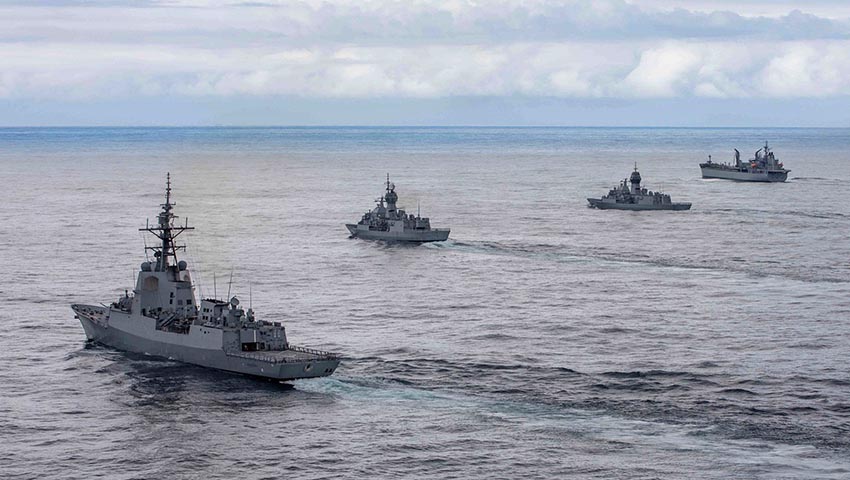The Royal Australian Navy has demonstrated the increasing capability of the fleet, as four warships formed off Australia’s east coast to conduct a tactical transit in the opening stages of Fleet Certification Period 2020 (FCP20).
The formation signalled the start of the sea phase of FCP20, which is the RAN’s first major training exercise for the year and focuses on mid-intensity, high-end warfighting.
HMA Ships Hobart (III), Stuart (III), Arunta (II) and Sirius conducted the evolution on their way to Bass Strait where they will join HMA Ships Canberra (III), Diamantina (II) and Huon (II) and HMA Submarines Collins and Farncomb for several weeks of detailed maritime warfare serials that graduate in difficulty and complexity.
Commodore Flotillas (COMFLOT) Commodore Michael Harris said FCP20 was a demonstration of the Royal Australian Navy’s rapidly advancing and highly capable sea and air control capabilities.
"The successful completion of FCP20 will demonstrate Navy’s ability to project power at sea, to maintain freedom of manoeuvre and open sea lanes and protect Australia's borders and national interests abroad," CDRE Harris said.
This year also marks the first time an air warfare destroyer has taken part in a Fleet Certification Period, with HMAS Hobart providing air-defence to the Task Group while minehunters Diamantina and Huon represent Navy's ability to insert minor war vessels into a large-scale activity alongside major fleet units and boost overall capability.
"FCP20 will re-affirm that we have an adaptive and responsive maritime task group able to operate across the full spectrum of warfare from humanitarian and disaster relief through to conflict in defence of Australia and its national interest," CDRE Harris added.
The surface and submarine combatants are also joined by a Royal Australian Air Force P-8A aircraft, a US Navy P-8 and a Royal New Zealand Air Force P-3, which will test the Task Group's readiness against airborne threats.
Exercises like FCP20 are a critical component of delivering Chief of Navy's Plan Pelorus 2022, as outlined at Pacific 2019 in Sydney.
A key component of Plan Pelorus 2022 is the renewed focus on Australia's immediate region, the Indo-Pacific:
"We live in an increasingly complex geo-political environment, within a dynamic Indo-Pacific region. The maritime domain is central to the security and prosperity of our nation. As resources become increasingly scarce, and the competition greater, all elements of national power must work together to achieve the desired outcomes for our nation, and those of our friends. Fuelled by technological advances and availability of information, the future is increasingly unpredictable," the planning statement said.
For Chief of Navy and the government as a whole, Navy operating as a critical 'sensor-shooter' combination within the broader 'joint force' will serve as a major force multiplier for Navy and as the guiding development principles for the introduction of Plan Pelorus 2022.
This renewed focus is broken down into seven key focal points, each with an interlocking and overlapping tactical and strategic impact for the development of the future Navy, its operating capacity and strategic capability into the middle of the 21st century.
Plan Pelorus 2022 reflects a significant undertaking when each element of the statement is defined:
- Workforce: We will be fully crewed at sea and staffed ashore, able to train for future demand, and prepared for continued growth;
- Lethal: We will be able to deny, deter and defeat our adversaries in the face of evolving threats and challenges;
- Integrated: We are integrated with the joint force and operate effectively with our allies and like-minded partners;
Battleworthy: We will provide sea, air and cyber worthy platforms to the Chief of Joint Operations; - Sustained: Our resources are optimised to enable conduct of all our activities and our future commitments;
- Persistent: We will be able to maintain a long-term presence away from our home ports; and
- Near region: Engaged across the Indo-Pacific; we meet all domestic requirements and work closely with our friends and partners in the near region.
Involving more than 2,000 military personnel, the sea phase of FCP20 will be held in the Bass Strait until 6 March, with participating ships also visiting ports in Victoria and Tasmania.



